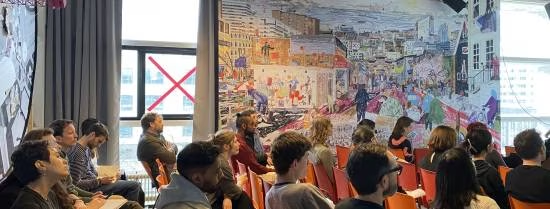How can we make Rotterdam more inclusive? That question drives the work of several organisations in Rotterdam and of various programs within Erasmus University. It motivated more than 30 representatives from the organisations and the university to join Vital Cities and Citizens' third Networking Tour with diversity and inclusion actors. Graduate students and researchers learned from the local civil society organisations and discussed possible collaborations with them.
The Networking Tour brought together seven organisations, dealing with a wide scope of social issues: PRIDE, SKIN Rotterdam, WE organisation, Humanitas ESSM, Independent School for the City, Shelter City Rotterdam, and WORM. Held at the Independent School for the City and WORM, both located in Rotterdam's city centre, the event served as a bridge between and among researchers and civil service organisations.
VCC Networking Tour with Diversity & Inclusion Actors

Fostering knowledge exchange and broadening the research scope
During the event, participants exchanged knowledge and discussed potential collaborations. Academics and graduate students heard from local civil society organisations, gaining insights into their work, and exploring ways to work together.
The conversations also served as a reminder for academics of the importance of broadening and diversifying their attention. As stressed by one of the first speakers, Karin de Schipper from SKIN, research tends to ignore certain societal groups. “There is a lot of strength and power in these communities,” she explained, in relation to the Christian international communities SKIN works with.
“One hand cannot really clap”
Various speakers saw this event as an opportunity to extend the important connecting work their organizations are doing. Adel AlBaghdadi, founder and chair of WE organization, for example, introduced various projects and activities with which WE aims at bringing diverse people together. Collaborations with other organizations and with the university, in his view, are crucial. “One hand cannot really clap –it’s an Arabic saying—but two can,” he explained. Likewise, Iris van der Graaf, the newly appointed chair of Rotterdam Pride, talked about the importance of joining forces with other organizations. “Universities, schools, hospitals…. It doesn’t matter… We need to keep in touch with each other; having the conversation, inspiring each other, asking questions, and making a better world together.”
The second part of the tour started with Epifania Queta welcoming the group to WORM and describing its efforts to facilitate alternative knowledge and art production. She was followed by David Benjamin and Leroy Vaarnold from Humanitas Expertise Center on Sexuality, Sex work and Human Trafficking, who discussed their organization’s efforts to empower sex workers. It is not only necessary to destigmatise sexual work, they said, but also to recognize diversity among sex workers. The last speakers, on behalf of Shelter City, were city coordinator Regina Klein and volunteer Alex Huang. Their presentation underscored the value of intensifying collaborations for both EUR and the human rights defenders they host. Contact with university experts as well as engagement in teaching and other activities can be beneficial for both, they explained.
Building a sense of community and connection
According to Isabel Awad and Maria Schiller, theme leads of the Diversity and Inclusion theme of Vital Cities and Citizens, the intention of the Networking Tours is to help connect people –across departments and faculties, but also from in and outside the university— who care about and (want to) work in contributing to social justice in Rotterdam. Connections “may open possibilities, including ways of imagining the city and our roles within it. They can also add strength to this topic in our university’s teaching and research,” argued Awad.
What did they take home from this 3rd Tour? Awad: "Many things, but it was especially heartwarming to see, in the borrel at the end, how people from different departments and organisations, students and staff, were having a drink together, extending some of the conversations we had had during the afternoon, and just having fun. We all made new friends and felt like a community that day."
The Networking Tour was organised by Wiebke Aepkers, Isabel Awad, and Maria Schiller.
Do you want to get an update on when the next Networking tour is coming up? Send an email to vcc.inclusion@eur.nl
- Associate professor
- Assistant professor
- More information
Vital Cities and Citizens
With the Erasmus Initiative Vital Cities and Citizens (VCC) Erasmus University Rotterdam wants to help improve the quality of life in cities. In vital cities, the population can achieve their life goals through education, useful work and participation in public life. The vital city is a platform for creativity and diversity, a safe meeting place for different social groups. The researchers involved focus on one of the four sub-themes:Inclusive Cities and Diversity
Resilient Cities and People
Smart Cities and Communities
Sustainable and Just Cities
VCC is a collaboration between Erasmus School of Social and Behavioural Sciences (ESSB), Erasmus School of History, Culture and Communication (ESHCC) and International Institute of Social Studies (ISS).

